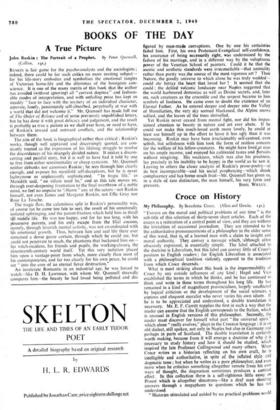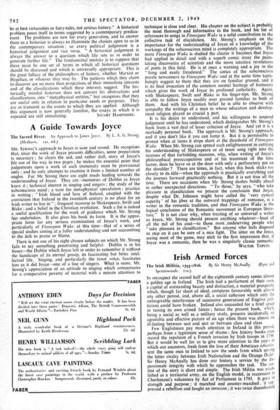Croce on History
My Philosophy. By Benedetto Croce. (Allen and Unwin. sss.)
" ESSAYS on the moral and political problems of our time " is the sub-title of this selection of thirty-seven short articles. Each of the essays is a reiteration of a central point of view, and they are without the trivialities of occasional journalism. They are intended to be the authoritative pronouncements of a philosopher in the older sense of this word, that is, of a learned man with a claim to insight and moral authority. They convey a message which, -although often obscurely expressed, is essentially simple. The label attached to the doctrine is Liberalism, but this label can convey little of Croce's position to English readers ; for English Liberalism is associated with a philosophical tradition violently opposed to the tradition from which Croce descends.- What
is most striking about this book is the. impermeability of Croce by any outside influences of any kind ; Hegel and Vico established the terms in which he thinks, and he has continued to think and write in these terms throughout his long life. He has remained in a kind of magnificent provincialism, largely unaffected by logical criticism or the development of the social sciences, a copious and eloquent moralist who never varies his own idiom. If he is to be appreciated and understood, a double translation is necessary. Mr. E. F. Carritt supplies the first in such a way that the reader can assume that the English corresponds to the Italian, which is unusual in English versions 6f this philosopher. Secondly, the reader must discover for himself what part " the universal spirit." which alone " really evolves," plays in the Crocean language ; it is an old dialect, still spoken, not only in Naples but also in Germany and perhaps in parts of Scotland. The double translation is certainly worth making, because from it will emerge a doctrine of why it is necessary to study history and how it should be studied, which inspired the late Professor Collingwood and many others. When Croce writes as a historian reflecting on his own craft, he is intelligible and authoritative, in spite of the inflated style and dogmatic tone ; but when he writes as a pure philosopher, and even more when he criticises something altogether remote from his own ways of thought, the dogmatism sometimes produces a comical effect. In this collection there is a self-righteous little essay on Proust which is altogether disastrous—like a deaf man shouting answers through a megaphone to questions which he has not understood.
" Histories stimulated and guided by no practical problems would be at best virtuosities or fairy-tales, not serious history." A historical problem poses itself in terms suggested by a contemporary predica- ment. The problems are new for every generation, and to answer them as a historian is always to illuminate the choices open to us in the contemporary situation ; so every political judgement is a historical judgement and vice versa. " A historical judgement is always the answer to a question which life sets us in order to generate further life." The fundamental mistake is to suppose that there must be one set of terms in which all historical questions should be discussed and which is universally appropriate. This is the great fallacy of the philosophers of history, whether Marxist or Hegelian, or whoever they may be. The patterns which they claim to discover are no more than projections of their immediate interests and of the classifications which these interests suggest. The his- torically minded historian does not convert his abstractions and classifications into " metaphysical entities," but recognises that they are useful only in relation to particular needs or purposes. They are as transient as the events to which they are applied. Although this argument is now generally familiar, the essays in which it is



































 Previous page
Previous page